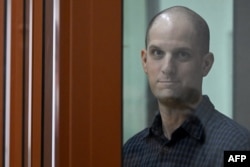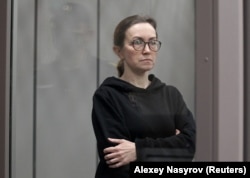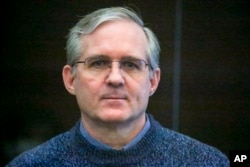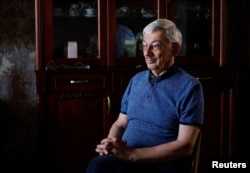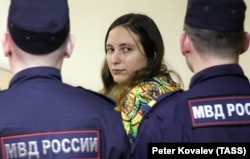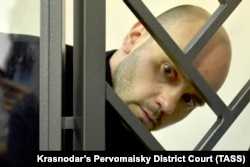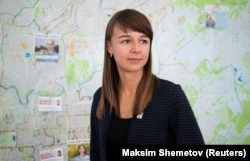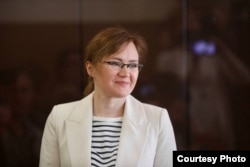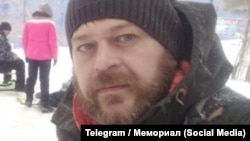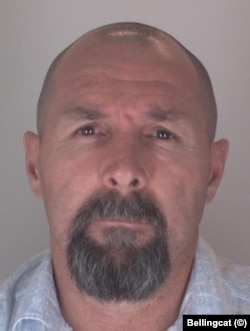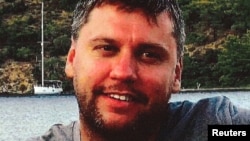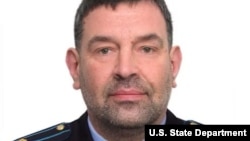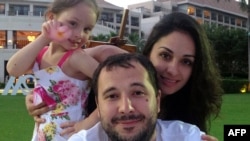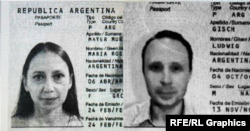A veteran human rights activist. A married couple who worked for years in deep-cover aliases. Two American journalists. The son of a Russian lawmaker.
The list of people released on August 1 in a multiple-country prisoner swap, the largest of its kind since the Cold War, is a diverse and sweeping roster of personalities and backgrounds, a mix of people with little to nothing in common — except being swept up in months of high-stakes, closed-door diplomatic wrangling.
Some were convicted by U.S. juries and sentenced to U.S. prison terms. Some were picked up on dubious allegations of espionage and railroaded through a Russian judicial system with little pretense of fair justice.
All 24 are now being set free, to either their home countries or elsewhere.
Here’s a comprehensive list of the people released on August 1, listed by country.
Held In Russia
Evan Gershkovich
Evan Gershkovich, a reporter with the Wall Street Journal, was found guilty on July 19 by a court in Yekaterinburg on espionage charges that he, his employer, and the U.S. government have rejected as politically motivated, and sentenced him to 16 years in prison. The 32-year-old was arrested in March 2023 while on a reporting trip to Yekaterinburg.
Accredited by Russia’s Foreign Ministry and based out of The Wall Street Journal’s Moscow bureau, Gershkovich was accused of trying to access classified information. Gershkovich was the first American journalist to be arrested on spy accusations in post-Soviet Russia.
Last month, prosecutors accused him of working on behalf of the CIA. The Wall Street Journal Journal has vehemently denied the accusation, calling the case against him a sham.
Gershkovich, who had been held in Moscow’s notorious Lefortovo prison, was officially designated as wrongfully detained.
Vladimir Kara-Murza
An opposition activist and former journalist, Vladimir Kara-Murza survived two near-fatal illnesses that U.S. authorities classified as “intentional poisoning.” His denunciations of the all-out Russian invasion of Ukraine led to a treason conviction and a 25-year prison sentence.
Kara-Murza, who worked closely with assassinated Putin foe Boris Nemtsov, also cultivated strong ties with members of U.S. Congress, which he leveraged to influence U.S. policy toward Russia.
Despite warnings, Kara-Murza returned from living abroad to Russia to continue his political work. In April 2022, about two months after the Ukraine invasion, he was detained by police in Moscow for allegedly disobeying police orders.
Later that year, prosecutors filed treason charges, and in April 2023 he was convicted and sentenced to 25 years in prison. He was sent to a maximum-security facility in the Siberian region of Omsk, where he was also placed in solitary confinement cells.
In the months leading up to his release, his allies had warned that his health had deteriorated, and he had lost an alarming amount of weight in the maximum-security prison where he was serving his sentence — one of the longest ever handed to a Kremlin opponent.
Alsu Kurmasheva
Alsu Kurmasheva, a Prague-based editor for RFE/RL’s Tatar-Bashkir Service, was detained by authorities in June 2023 as she was visiting relatives in the central Russian region of Tatarstan.
A dual Russian-U.S. citizen, she was initially charged with not declaring her U.S. passport, and released, but barred from leaving the country.
That October, however, she was arrested and hit with additional charges of being an undeclared foreign agent — under a draconian law targeting journalists, civil society activists, and others. She was later hit with an additional charge: distributing “fake” news about the Russian military, a charge stemming apparently from her work editing a book about Russians opposed to the Ukraine war.
On July 19, Kurmasheva was convicted by a Tatarstan court and sentenced to 6 ½ years in prison, after a secret, closed-door trial.
Paul Whelan
Paul Whelan, 54, was arrested in December 2018 while visiting Moscow for a friend’s wedding, and accused of receiving a computer flash drive that contained classified information.
A former U.S. Marine who was working as a corporate security executive at the time, Whelan has said he was set up in a sting operation and that he thought the thumb drive contained vacation photographs from his friend. In June 2020, a Russian court convicted him of espionage and sentenced him to 16 years in prison.
His time has been spent largely in a prison in the central region of Mordovia. Whelan’s family and the U.S. government have called his conviction a sham and a mockery of justice. Whelan, who also holds British, Canadian, and Irish citizenship, was designated by the U.S. government as wrongfully detained.
Ilya Yashin
Ilya Yashin, 41, has been a stalwart of street protests in the Putin era and was also a close ally of Nemtsov, presenting a report on Russian involvement in the war in Ukraine’s Donbas region that Nemtsov had been working on when he was shot dead in 2015.
A local lawmaker who was chairman of his Moscow district council in 2017-21, Yashin was convicted and sentenced to 8 1/2 years in prison in December 2022 over criticism of what he has called Russia’s “monstrous war” in Ukraine.
The charge stemmed from YouTube posts in which Yashin spoke about the killings of civilians in Bucha, a city outside Kyiv where survivors, rights activists, and Ukrainian authorities say Russian forces committed atrocities before withdrawing following Russia’s failure to capture the capital.
In his final court appearance before the verdict, Yashin urged Putin to “stop the madness” and end the war by withdrawing Russia’s forces from Ukraine, adding: “Your name is now firmly associated with the words ‘death’ and ‘destruction.'”
Oleg Orlov
Oleg Orlov, 71, is one of the most experienced and respected human rights activists in Russia, with a record of advocacy stretching back to the Soviet era and encompassing reporting on abuses in Moscow, Chechnya, and nationwide.
A co-chairman of the now outlawed Nobel Peace Prize-winning Memorial human rights center, Orlov was convicted in February of repeatedly discrediting the Russian military and sentenced to 30 months in prison, a ruling that was upheld in July.
The charge against Orlov stems from an article in which he condemned the Ukraine invasion and said that Russia was “slipping back into totalitarianism, but this time the fascist kind.”
“The bloody war that Putin’s regime has unleashed in Ukraine is not only the mass murder of people and the annihilation of infrastructure, economy, and cultural sites. Not only the destruction of the foundations of international law,” he wrote. “It is also a severe blow to the future of Russia.”
Kevin Lik
Lik, a dual German-Russian citizen, was sentenced to four years in prison in December 2023 after being convicted of treason following a closed-door trial. He was 18 years old at the time of his conviction.
A resident of the North Caucasus region of Adygea, Lik was found guilty of observing and photographing the local military base and sending the pictures by e-mail to a representative of a foreign government, according to Russian prosecutors.
Memorial designated Lik a political prisoner.
Aleksandra Skochilenko
Aleksandra Skochilenko, 33, is a St. Petersburg artist who protested against the Ukraine invasion shortly after Putin launched it in February 2022 by replacing five shelf tags in a grocery store with information about the war.
One said that Russia had “bombed an art school in Mariupol where about 400 people were seeking shelter.” Another read, “Putin has been lying to you from the television screen for 20 years. The result of these lies is our willingness to accept war and senseless deaths.”
Skochilenko, who usually goes by the familiar form of her name, Sasha, was convicted in November 2022 of distributing false information about the Russian military and sentenced to seven years in prison. She argued that the words on the tags were the truth.
“My great-grandfather didn’t participate in World War II for four years so that Russia would become a fascist state and attack Ukraine,” Skochilenko wrote on one of them. In a final statement in court, she wondered aloud why the state was frightened by “five tiny pieces of paper.”
Andrei Pivovarov
Andrei Pivovarov, 42, is the former executive director of the now-defunct pro-democracy Open Russia movement set up by exiled former oil tycoon Mikhail Khodorkovsky. He was detained in May 2021 after being taken off a Warsaw-bound plane just before takeoff from St. Petersburg and sentenced to four years in prison in July 2022 on a charge of heading an “undesirable organization.”
Memorial has declared Pivovarov a political prisoner, saying his right to a fair trial was violated.
The “undesirable organizations” law, adopted in 2015, was part of a series of regulations pushed by the Kremlin that squeezed many nonprofit and NGOs that received funding from foreign sources — mainly from Europe and the United States.
These laws are widely seen as a tool to stamp out political dissent and tighten the Kremlin’s control over the country’s political landscape.
Ksenia Fadeyeva
Ksenia Fadeyeva, 32, is a former local lawmaker and the former head of Navalny’s regional office in the Siberian city of Tomsk. In December 2023, she was convicted on charges including organizing activities of an extremist group and was handed a nine-year prison term.
Her lawyer, Semyon Vodnev, called the judge’s ruling “illegal, ungrounded, and unjust.” He argued, among other things, that Fadeyeva had ended her involvement with Navalny’s organization before it was labeled extremist in 2021.
At the time of her conviction, Navalny’s spokeswoman, Kira Yarmysh, hailed Fadeyeva as “honest and brave” and said that those who fabricated the criminal case against her would eventually face punishment.
In May, a court rejected Fadeyeva’s appeal and Tomsk officials stripped her of her mandate in the city council in June.
Demuri Voronin
Political scientist Demuri Voronin, a Russian-German national, was convicted on a high treason charge and sentenced to 13 years and three months in prison by the Moscow City Court in March 2023.
Voronin was arrested in Moscow in 2021, hours before he was due to depart to Berlin. The case materials were classified, but Voronin was mentioned in a high treason case against journalist Ivan Safronov, who was sentenced to 22 years in prison in September 2022 and was declared a political prisoner by Memorial.
Voronin owned a consulting company in Moscow that collaborated with noted journalists.
Patrick Schoebel
Patrick Schoebel, a German, was arrested at Pulkovo Airport in St. Petersburg earlier this year after officers who searched him said they found cannabis gummies. Accused of drug possession and smuggling, Schoebel was jailed in Moscow.
The Russian Federal Customs Service said Schoebel told the authorities he brought 10 gummies from Germany into Russia to have a more “restful sleep” on long flights. Russia claimed that a test of the gummies found they contained a banned substance.
Schoebel had faced up to seven years in prison, according to the Customs Service and Russian state media reports. At the time of the prisoner swap, it was not immediately clear whether he had been tried.
German Moyzhes
German Moyzhes, a dual German-Russian citizen who was living in St. Petersburg, is a lawyer and reportedly a managing partner in a company that provides support to Russians seeking residence permits in the European Union. He has also been a public advocate for pedestrian and cyclist-friendly streets.
Moyzhes was arrested in late May while riding his bicycle along an embankment in St. Petersburg, accused of treason, and sent to the Lefortovo prison. It was unclear whether his trial had begun when the exchange took place.
Lilia Chanysheva
Lilia Chanysheva, 42, is the former head of the branch of Navalny’s political network in Ufa, the capital of the Bashkortostan region. The network, established for Navalny’s unsuccessful bid to get on the 2018 presidential ballot and challenge Vladimir Putin, was branded “extremist” in 2021.
In June 2023, Chanysheva was convicted of crimes including creating an extremist community and inciting extremism and was sentenced to 7 ½ years in prison. The regional Supreme Court later extended her term by two years, saying the initial sentence was too lenient.
In comments to RFE/RL from jail before her conviction, Chanysheva described the case against her as “not only political, but actually absurd.” Navalny, who died in suspicious circumstances in prison in February 2024, testified in her trial 10 months earlier.
“Think about the beautiful Russia of the future that we will achieve. Thanks to you and people like you, we will do this. You are a rock. I never doubted you, not for one second…. I am so happy I know you,” Navalny said. “You have inspired a huge number of people.”
Vadim Ostanin
Vadim Ostanin, 47, is the former head of a local branch of Navalny’s team in the Siberian city of Barnaul.
He was arrested in December 2021 and charged with organizing an extremist community and propagating the activities of a noncommercial organization that encroaches on citizens’ privacy and rights.
The charges were related to the activities of Navalny’s Anti-Corruption Foundation, which published numerous investigations into corruption and cronyism involving Putin and his close associates, as well as other top Russian officials.
Ostanin was sentenced to nine years in prison in July 2023 for activities that Navalny’s supporters called “legal political work.” Memorial designated him a political prisoner.
Held In Belarus
Rico Krieger
A German citizen, Rico Krieger, 30, was sentenced to death in Belarus in June, before he was pardoned by Belarusian leader Alyaksandr Lukashenka on July 30. Lukashenka’s office provided no additional information about the reasoning behind the pardon.
Details of Krieger’s case were not known until the Vyasna human rights group reported that he was sentenced to death in June for mercenary activity, terrorism, creating an extremist group, intentionally damaging a vehicle, and illegal operations with firearms and explosives.
According to Vyasna, it was the first trial in Belarus for “mercenary activity” and the charges were connected to the Kalinouski Regiment, a group of anti-government Belarusian exiles fighting for Ukraine. The Kalinouski Regiment denies any connection to the case.
Krieger was born in Berlin and worked as a paramedic for the German Red Cross, according to Vyasna. He has a young son, who lives in Germany.
He worked previously as a special security officer for the U.S. State Department in Berlin, where he gained experience in armed security operations. He then moved to health care and worked as a nurse specializing in emergency medical care.
Held In Germany
Vadim Krasikov
Vadim Krasikov, 59, also known as Vadim Sokolov, is a former Russian FSB officer currently serving a life sentence in Germany for the 2019 murder of ex-Chechen field commander Zelimkhan Khangoshvili in Berlin.
German prosecutors stated that Krasikov shot Khangoshvili from a bicycle before attempting to flee. He was arrested after being seen changing clothes behind a bush.
The German investigation identified Krasikov as a senior officer in the FSB’s Vympel special forces unit. Additionally, a joint investigation by Bellingcat, The Insider, and Der Spiegel found connections between Krasikov and the FSB, linking him to other crimes.
Prosecutors in Germany claimed that Moscow ordered the assassination because Khangoshvili had commanded separatist forces in Russia’s North Caucasus region from 2000 to 2004 and was seeking refuge in Germany.
In 2015, Khangoshvili survived a daylight assassination attempt in central Tbilisi, where he was shot four times in the arm and shoulder.
Krasikov has been serving his sentence in a German prison since 2021.
Held In Norway
Mikhail Mikushin
Norwegian investigators in 2023 announced that an academic who claimed Brazilian citizenship and who worked as a university lecturer was in fact an undercover Russian agent named Mikhail Mikushin.
Mikushin had first traveled to Norway, to work at the Arctic University of Norway in 2021, identifying himself as Jose Assis Giammaria, according to Norwegian media. But year later, he was arrested, first on charges of lying about his identity, and then later with being a Russian spy.
In 2023, Mikushin reportedly confessed to using a false identity.
He has been held in an Oslo prison, and had faced up to three years in prison under Norwegian espionage laws.
Held In The United States
Vladislav Klyushin
An IT entrepreneur who ran a Moscow company linked to the Russian government, Vladislav Klyushin was arrested on a ski trip in Switzerland in March 2021 on a U.S. arrest warrant for insider trading. He was accused of using hacked press releases to make stock trades.
After extradition to the United States, he was found guilty by a U.S. jury and sentenced to nine years in prison in September 2023.
During the trial, U.S. prosecutors repeatedly referenced Klyushin’s partnership with a man identified as an officer with the Russian military intelligence agency widely known as the GRU. That man, Ivan Yermakov, was charged in a separate indictment brought by Special Counsel Robert Mueller for the hacking of the Democratic Party during the 2016 U.S. presidential election.
Vadim Konoshchenok
Vadim Konoshchenok, 49, is a suspected Russian intelligence agent who was detained by Estonian authorities in October 2022. At the time of his detention on a U.S. arrest warrant, U.S. prosecutors said that Konoshchenok was attempting to cross into Russia while carrying some three dozen types of microelectronics and electronic components.
They called Konoshchenok “a critical participant in a scheme to provide sensitive, American-made electronics and ammunition in furtherance of Russia’s war efforts and weapons development” in violation of U.S. sanctions.
He was taken into U.S. custody in July 2023. He pleaded not guilty to charges that, if convicted, could have resulted in a maximum 30-year prison sentence.
Roman Seleznyov
The son of a member of Russia’s lower house of parliament, Roman Seleznyov was arrested by U.S. authorities in 2014 on an arrest warrant for credit card fraud. His arrest, at an airport in the Maldives, followed by a quick extradition to the U.S. territory of Guam, sparked accusations by Moscow that he was kidnapped.
U.S. investigators said they uncovered his online activities in the late 2000s and asked the Federal Security Service for help. But his online footprint soon disappeared, leading U.S. investigators to believe Russia was protecting him.
Seleznyov, whose name was spelled Seleznev in U.S. court papers, eventually received a 27-year sentence — one of the harshest sentences ever handed down to a Russian hacker because he chose to fight his case despite a preponderance of evidence rather than cooperate.
Held In Slovenia
Anna Dultseva And Artyom Dultsev (aka Maria Rosa Mayer Munos And Ludwig Gisch)
Ludwig Gisch and Maria Rosa Mayer Munos are Russian citizens using aliases who were arrested in Slovenia in December 2022 on charges of spying for Russia. Shortly before the prisoner swap, the couple pleaded guilty to “spying and falsifying documents.” Their real names are believed to be Artyom Dultsev and Anna Dultseva, and they both hold Argentinian passports and are around 40 years old.
In 2017, the couple moved to Slovenia, where the husband ran an IT company and the wife operated an Internet art gallery. Media reports stated that they used Slovenia as a base to provide cash to Russian sleeper agents in the EU.
Following their guilty plea, a Ljubljana court on July 31 sentenced them to more than 18 months in prison but then ordered their expulsion.
Held In Poland
Pablo Gonzalez (aka Pavel Rubtsov)
Pablo Gonzalez is a Spanish-Russian freelance journalist who was arrested in Poland in February 2022 on charges of spying for Russia. Poland’s ABW counterintelligence agency said in a statement at the time that it had identified him as an agent of Russian military intelligence.
Gonzalez, who was born in Russia and is also known by his Russian name, Pavel Rubtsov, was alleged by Polish intelligence to have “carried out activities for Russia using his journalistic status,” including in “zones affected by armed conflicts and areas of political tension.”
He was charged with “participating in the activities of foreign intelligence against Poland.”
The independent Russian media outlet Agentstvo reported shortly after Gonzalez’s arrest that he had compiled reports on Nemtsov’s daughter, Zhanna Nemtsova, after befriending her.
Press-freedom watchdogs said Gonzalez should not be targeted for his journalistic activities and urged Poland to substantiate the charges against him.
Among the media outlets that Gonzalez had provided reporting to is the U.S.-funded broadcaster VOA, which said it had taken six stories from him in 2020-21 and conducted a review of his work following his arrest.
With reporting by RFE/RL correspondent Todd Prince, AP, AFP, the BBC, and The Moscow Times
This post was originally published on this site be sure to check out more of their content.




